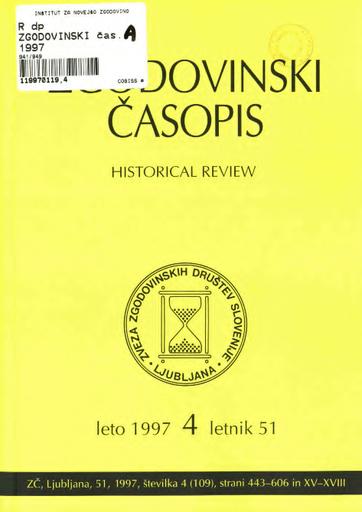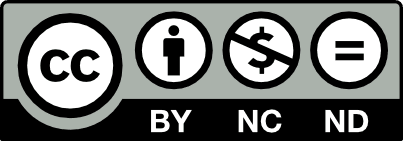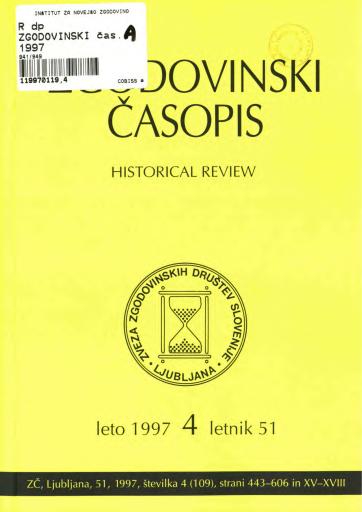
/
Periodicals
/
Zgodovinski časopis
Ideal, Socio-economic, National and Political Views of Slovene Middle Classes in the Period Between World War I and II (1918-1941)

Author(s):Jurij Perovšek
Co-author(s):Vasilij Melik (odg. ur.)
Leto:1997
Publisher(s):Zveza zgodovinskih društev Slovenije, Ljubljana
Source(s):Zgodovinski časopis, 1997, št. 4
Language(s):slovenščina
Type(s) of material:text
Keywords:obdobje med vojnama, politika, liberalizem, primerjave, nacionalno vprašanje, unitarizem, avtonomija, Jugoslavija, katolicizem
Rights:

This work by Jurij Perovšek is licensed under Creative Commons Attribution-NonCommercial-NoDerivs 4.0 International
Files (1)

Name:ZGODOVINSKI_CASOPIS_LETO_1997_LETNIK_51_STEVILKA_4.pdf
Size:8.30MB
Format:application/pdf
Permanent link:https://hdl.handle.net/11686/file165
Description
Author deals with the ideal, socio-economic, national and political views of Slovene liberal and catholic civic politics in the period of the first Yugoslav state, establishing that these views were more alike than different. Both sides rejected communism, fascism and nazism, favoured anti-Semitism, and in the 30's also the class corporate system and a disciplinary, or authoritarian, democracy. Their differences of opinion concerned constant catholic and liberal ideologies and political opposition, and the national problem. As far as the latter is concerned, liberals defended Yugoslav national unitarism and state centralism, while the Catholic party wanted to preserve the Slovene national individuality and demanded an autonomist, federal transformation of the Yugoslav state. At the end of his paper the author stresses the fact that after 1945 the hitherto ideal, socio-economic, national and political civic views became part of the historic memory.
Metadata (12)
- identifierhttps://hdl.handle.net/11686/14883
- title
- Idejni, socialnogospodarski in narodnopolitični nazori slovenskega meščanstva v času med svetovnima vojnama (1918-1941)
- Ideal, Socio-economic, National and Political Views of Slovene Middle Classes in the Period Between World War I and II (1918-1941)
- creator
- Jurij Perovšek
- contributor
- Vasilij Melik (odg. ur.)
- subject
- obdobje med vojnama
- politika
- liberalizem
- primerjave
- nacionalno vprašanje
- unitarizem
- avtonomija
- Jugoslavija
- katolicizem
- description
- Author deals with the ideal, socio-economic, national and political views of Slovene liberal and catholic civic politics in the period of the first Yugoslav state, establishing that these views were more alike than different. Both sides rejected communism, fascism and nazism, favoured anti-Semitism, and in the 30's also the class corporate system and a disciplinary, or authoritarian, democracy. Their differences of opinion concerned constant catholic and liberal ideologies and political opposition, and the national problem. As far as the latter is concerned, liberals defended Yugoslav national unitarism and state centralism, while the Catholic party wanted to preserve the Slovene national individuality and demanded an autonomist, federal transformation of the Yugoslav state. At the end of his paper the author stresses the fact that after 1945 the hitherto ideal, socio-economic, national and political civic views became part of the historic memory.
- Avtor obravnava idejne, socialnogospodarske in narodnopolitične nazore slovenske liberalne in katoliške meščanske politike v času obstoja prve jugoslovanske države. Ugotavlja, da so si bili ti nazori bolj podobni, kakor pa ne. Podobni v zavračanju komunizma, fašizma in nacizma ter v protisemitskem stališču, v tridesetih letih pa še v zavzemanju za stanovsko korporativni sistem in za disciplinirano oziroma avtoritarno demokracijo. Razhajali pa so se v trajnem katoliško-liberalnem svetovnonazorskem in političnem nasprotovanju in v pogledih na nacionalni problem. V zvezi s slednjim so liberalci zagovarjali jugoslovanski narodni unitarizem in državni centralizem, katoliški pol pa je vztrajal pri ohranitvi slovenske narodne individualnosti in terjal avtonomistično-federativno preoblikovanje jugoslovanske države. Avtor ob koncu opozarja, da so bili po letu 1945 dotedanji idejni, socialnogospodarski in narodnopolitični meščanski pogledi preloženi v zgodovinski spomin, obravnava kasnejših pa zadeva današnji ali šele prihodnji čas.
- publisher
- Zveza zgodovinskih društev Slovenije
- date
- 1997
- type
- besedilo
- language
- Slovenščina
- isPartOf
- rights
- license: ccByNcNd
Citirano v (1)
| Tipologija | Avtor(ji) | Naslov | Kraj | Založba | Leto |
|---|---|---|---|---|---|
| 2.01 Znanstvena monografija | Perovšek, Jurij | Slovenci in slovanski svet : politične slike od včeraj in danes | Ljubljana | Inštitut za novejšo zgodovino | 2019 |